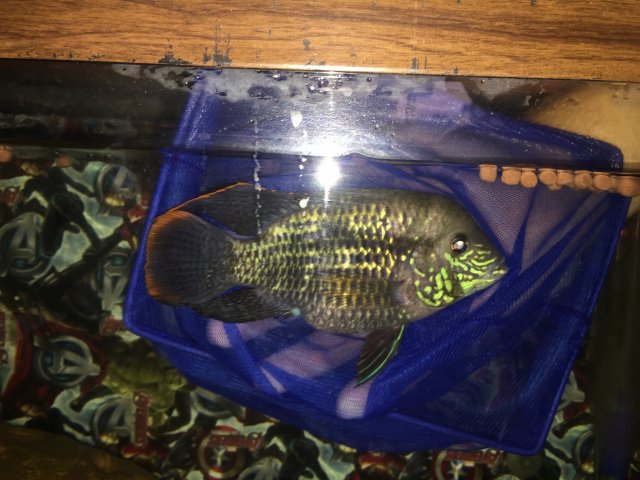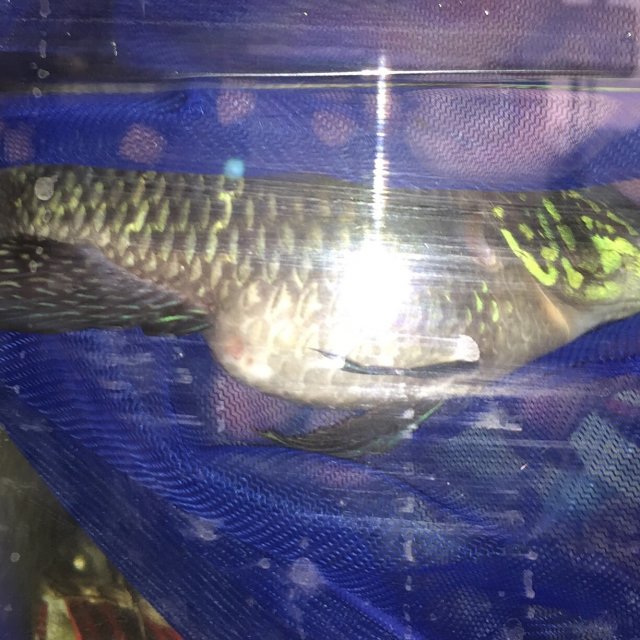BLOAT - Photos & Treatment
- Thread starter Oddball
- Start date
I was wondering, does bloat ever happen because of age? I had a beta who turned into a sad, listless, pine-cone at 4.3 years old. It was a general scale standing with no tummy area bulge or anything. He just looked like he had been inflated. Nothing helped him and eventually he died. I figured his little kidneys had just failed due to his age. They are only supposed to live 5 years.
Renal damage can cause bloating. That's really above average lifespan for a betta. I rarely hear of bettas exceeding three years. As the fish ages, the organs do start to malfunction and most fish become vulnerable to health issues.Dreamsing;4858328; said:I was wondering, does bloat ever happen because of age? I had a beta who turned into a sad, listless, pine-cone at 4.3 years old. It was a general scale standing with no tummy area bulge or anything. He just looked like he had been inflated. Nothing helped him and eventually he died. I figured his little kidneys had just failed due to his age. They are only supposed to live 5 years.
This article was very informative and, for the most part, is exactly what my local fish breeder told me with the exception of the Epsom Salts. I have a 180 gallon freshwater tank and I've lost 10 large and costly african cichlids. I was told to do that water changes; to use 1/4 tsp of Metronidazole per 20 gallons of water (2 1/4 tsp total); and 14 Tbsp of Epsom Salts. Your article calls for much much more so I'd like to get some feedback. I'm still losing fish and I'm desperate. Some people have recommended CLOUT, but I can't use that for fear of harming my catfish. Please advise!
Treating as I've described in the OP should help your tank. It's the method I've used successfully in my affected Tanganyikan tanks.This article was very informative and, for the most part, is exactly what my local fish breeder told me with the exception of the Epsom Salts. I have a 180 gallon freshwater tank and I've lost 10 large and costly african cichlids. I was told to do that water changes; to use 1/4 tsp of Metronidazole per 20 gallons of water (2 1/4 tsp total); and 14 Tbsp of Epsom Salts. Your article calls for much much more so I'd like to get some feedback. I'm still losing fish and I'm desperate. Some people have recommended CLOUT, but I can't use that for fear of harming my catfish. Please advise!
BTW, what are you feeding to your stock? I ask because bloodworms and blackworms can have an adverse effect on many african species.
I have a question. I encountered something from another website and the person had a male koi fish that is matured.
He found his fish had dropsy one day and he knocked out the fish and slit underneath the fish's scales and push out the puss...... Kinda gross. Then after he put his fish in a hospital tank and like tried to wake him up etc.... and took care of him until his fish is better again.
Thing is... you guys use salt and this guy slit underneath his fish's scales.... Did anyone tried that method before? You know... slit a fish....
He found his fish had dropsy one day and he knocked out the fish and slit underneath the fish's scales and push out the puss...... Kinda gross. Then after he put his fish in a hospital tank and like tried to wake him up etc.... and took care of him until his fish is better again.
Thing is... you guys use salt and this guy slit underneath his fish's scales.... Did anyone tried that method before? You know... slit a fish....
People that have Tropheus African Cichlids Do 30% water changes and redoses full dosage with weach water change and use epsom salts as well. All of this for 7 days nomrlaly does the trick. Then slowly reintroduce food soaked in metro... But remember to cover the tank completely, blocking all light, keeping lights off and removing all carbon until treatment is completed... Has worked for me. But of course there are those fish are to far advnaced in the sickness to cure.This article was very informative and, for the most part, is exactly what my local fish breeder told me with the exception of the Epsom Salts. I have a 180 gallon freshwater tank and I've lost 10 large and costly african cichlids. I was told to do that water changes; to use 1/4 tsp of Metronidazole per 20 gallons of water (2 1/4 tsp total); and 14 Tbsp of Epsom Salts. Your article calls for much much more so I'd like to get some feedback. I'm still losing fish and I'm desperate. Some people have recommended CLOUT, but I can't use that for fear of harming my catfish. Please advise!
I'm getting ready to treat a 135 gallon just to make sure that I'm getting every last bit of the bloat taken care of. It all started with a power outage... 3months ago....
I need help ASAP. My green terror has bloat I guess and I'm leaving to vacation on Sunday till Friday. Is there anything I can do right now to help the fish "quickly"? Like a bath with epsom salt?To treat Bloat, the plan of attack is:
Metronidazole and water changes, water changes, water changes!!
1. Remove carbon/resins from filter.
2. Perform a 30-50% water change (reduces free-floating bacteria population)
3. Add salt (teaspoon to a tablespoon per gallon) to aid the fish's osmotic regulation processes.
4. Treat with 250mg/20gallons of Metronidazole (Flagyl)
5. Leave for 3 days and do not feed.
6. After 3 days, perform another large water change.
7. Replace the salt.
8. Add full dosage of Metronidazole.
9. Wait another 3 days. During this phase, the bloat should be decreasing in appearance. In large fish, the water may take on an ammonia odor from the high volume of urea the fish should now be producing due to reducing the bloat and recovering renal activity.
10. 3rd day, another water change. Also, replace the salt and redose the metronidazole (full dose). If the fish looks to be well on the road to recovery you can offer a small feeding each day.
11. Another water change on the 3rd day. No meds but, I'd recommend the salt. You should be clear now.
This is the treatment I use on my africans, puffers, and my lungfishes/polypteridae. Knock on wood that it's worked every single time.
An old school method of treating bloat is with the use of epsom salt at the rate of 2 tablespoons per 10 gallons of tank volume. This method has been successful but, takes longer to treat than by using Metronidazole.
Note in the pics the abdominal distention caused by the bacteria and in a severe case, such as this, the scales are pushed away from the body.
Tokis-Phoenix adds: (For full freshwater (aka sweetwater))
There are many things that can cause bloating, constipation and dropsy being the main two.
Dropsy;
The problem with treating this disease is that there are a number of "potential" causes: bacterial infection, parasites, cancerous tumors, virus', internal fungal infections or sudden temperature drop of more than 3 degrees.
If the cause is bacterial, the swelling typically comes on pretty rapidly. If swelling is gradual then one or more of the other potential causes are more likely. Unfortunately, treatment is most often useless at this point due to the advanced state of the disease process. When the illness, whatever the cause, has progressed far enough to cause internal swelling, the concomitant internal damage is usually too extensive to be repairable.
The latest research has shown that if the disease cause is bacterial and if the disease process is caught early enough, treatment with Romet B, a broad spectrum antibacterial, *may* be effective when used concurrent with an increase in water temperature to 84-86ºF for 2 weeks minimum.
BE CERTAIN to maintain HIGH OXYGEN LEVELS during such treatment since at these temperatures, water holds significantly less oxygen at these higher water temperatures. One of the suspected bacterial precursors to the disease process -- Aeromonas, is killed at these temperatures.
Concurrently add 1/8 teaspoon of EPSOM SALT -- per 5 gallons of water . Feeding foods soaked in ERYTHROMYCIN will kill the second suspected bacteria, Mycobacterium. In rare cases popeye has been found to be caused by Edwardsiella etarda. This is found *only* in fish that have been bred in outdoor ponds -- the functional bacteria in this case is carried by frogs. While fair to good results in treatment have been found by feeding Romet B., even better results have been found using injectable chloramphenicol or amakacin. This is best done by your veterinarian.
If parasites are a known cause, treat for them first for 3 days increasing the temperature to 86ºF as fast as possible.
EPSOM SALT may help reduce the internal pressure caused by the swelling. Extremely good aeration is necessary here due to the use of such high temperatures.
NEVER USE SALT (sodium chloride, a.k.a. aquarium salt) for treatment of dropsy. This will KILL your fish in a very short time. The affected fish are already having a difficult time getting rid of salts due to kidney dysfunction. This causes the blown up appearance and concurrent scale standing. The osmotic imbalance caused by addition of sodium to your tank water will make this condition far worse.
EPSOM SALT on the other hand, does not pass through the walls of the gut or gills and will extract water OUT of the surrounding tissue into the gut where it *may* be excreted.
View attachment 54466
View attachment 54467
View attachment 54468
View attachment 54469
View attachment 54470











